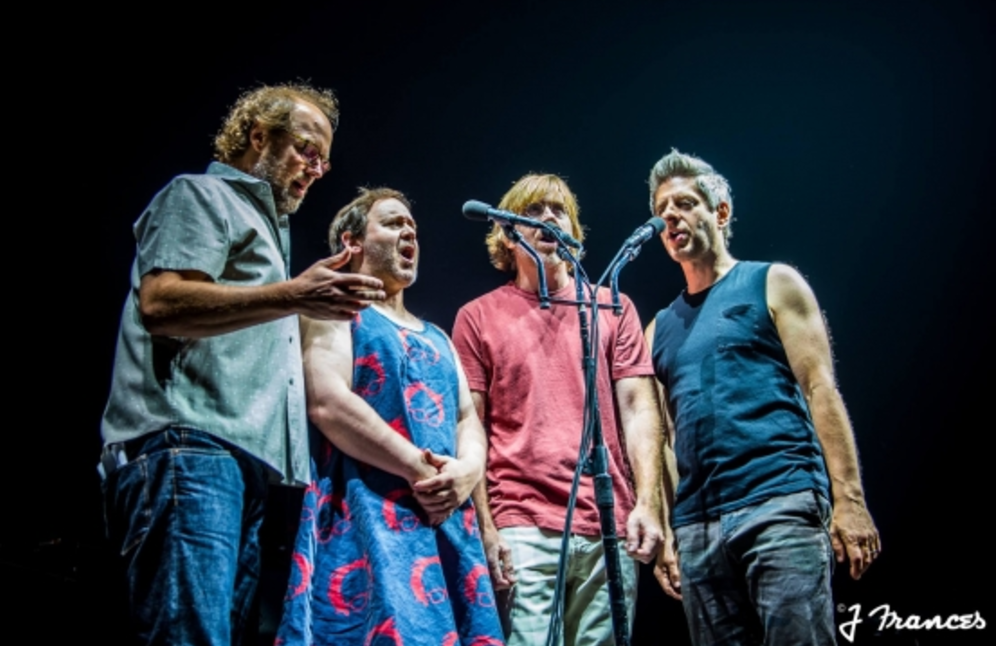
_Josh Frances_
In the new issue of Rolling Stone, Phish discuss the before and after of their 2004 breakup, their eventual reunion in 2009 and the new rules that the band had to put into place in the 3.0 era, with each member candidly speaking on the high times and the low.
When the band got back together in 2009, it was apparently decided that they would no longer criticize each other’s playing, which had been an issue in the past. Later in the article, Trey Anastasio admits that he doesn’t always remember that in the moment onstage, as the frontman recently called drummer Jon Fishman out for not being in sync with bassist Mike Gordon during a run of “Moma Dance” during their summer tour-closing run in Colorado.
Fishman also commented on Anastasio’s tendency to jump from one idea to the next in a rapid-fire whirlwind that sometimes left other ideas behind. “He never meant to squelch anyone else’s ideas,” Fishman says. “But I think it stepped on people’s toes at moments. There was no bad intent.” Anastasio later shows his love for his bandmates ideas, however, when he laments how Gordon’s “Let’s Go,” which both musicians were excited about, didn’t make it on to their recent record, Big Boat.
On the 2004 breakup, Anastasio talk about his addiction to drugs, saying that the band had doctors signing prescriptions for the members, and the backstage after-party open bar they called the “Betty Ford Clinic” became too much to handle. “It was like Dante’s Inferno.” he says. “It was the outer rings of hell back there.” Anastasio also mentions the “layer of shame” that he began to feel about his playing before the hiatus.
Anastasio had stretches of time where he didn’t talk to members of the band, and he even blamed Fishman for the breakup at one point in one of his more emotional moments. “In crisis, you hurt the ones you love the most,” Anastasio says. “We’ve talked about that a lot.” The guitarist also mentions how his bandmates helped him out of his hole after his Upstate New York 2006 arrest, taking him bowling and presenting him with a 43-track album for his 43rd birthday. Each track was 43 seconds long. “They pulled me back into the life raft,” Anastasio admits. “I’m forever grateful for that.”
Some members of Phish weren’t fully convinced that a reunion was the best idea, in fact. Page McConnell, who didn’t talk with Anastasio for a while during the break, says, “I wasn’t sure I wantd to fire it up again. I was cautious.” Eventually, after some “heavy conversations,” he was in. The keyboardist also notes that he had had moments of feeling like an outsider in the band in the past, but now feels completely connected, manifesting in his biggest songwriting contribution so far on Big Boat.
Gordon also was hesitant to return to the band, as he was busying himself with a plethora of other projects that he didn’t want to give up. Anastasio assured him that they “can have the best of both worlds,” which resulted in the band implementing a 50 show per year limit on Phish tours starting in 2009. Now, Gordon and the band are feeling as on top of their game as ever. “When I’m really liking it, it doesn’t feel like a jam band,” Gordon says. “It feels like Radiohead, meditative and creative.”
Anastasio touches on the band’s plans for their New Year’s run at New York’s Madison Square Garden, briefly flashing a sketch of their setup for the night. “The other guys haven’t even heard what we’re going to do yet,” he says. “But it’s going to be awesome.”


No Comments comments associated with this post